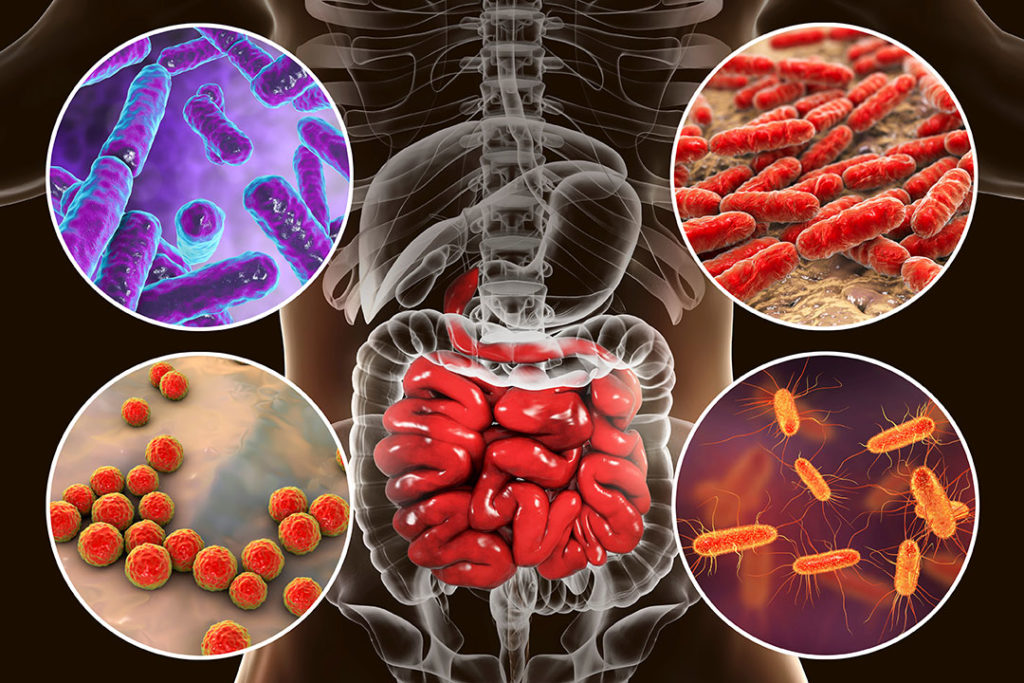Gut Health
I’m sure you’ve heard about the importance of “gut health” over the past few years. But what’s all the hype about? The gut microbiota (or microbiome, previously referred to as flora), has trillions of microorganisms that live in our digestive tract. When these organisms are balanced they protect us from infection, help with digestion, produce vitamins and neurotransmitters and maintain a protective barrier- which helps us avoid developing food allergies.
 Dysbiosis can occur when the bacteria colonies within our microbiome become imbalanced. Several things can cause dysbiosis like poor diet; certain medications like antibiotics, acid reducing drugs and NSAIDs; and stress. These factors can lead to the overgrowth of one of more microbial colonies which can disturb smaller beneficial colonies that our body depends on. Some of the symptoms that dysbiosis presents are bad breath, nausea, constipation, diarrhea, bloating, chest pain, rash or redness, fatigue, trouble concentrating, anxiety and depression. Some research even suggests Lupus is linked to an imbalanced microbiome , and there are theories that the microbiome may be a therapeutic avenue for patients who suffer from Multiple Sclerosis.
Dysbiosis can occur when the bacteria colonies within our microbiome become imbalanced. Several things can cause dysbiosis like poor diet; certain medications like antibiotics, acid reducing drugs and NSAIDs; and stress. These factors can lead to the overgrowth of one of more microbial colonies which can disturb smaller beneficial colonies that our body depends on. Some of the symptoms that dysbiosis presents are bad breath, nausea, constipation, diarrhea, bloating, chest pain, rash or redness, fatigue, trouble concentrating, anxiety and depression. Some research even suggests Lupus is linked to an imbalanced microbiome , and there are theories that the microbiome may be a therapeutic avenue for patients who suffer from Multiple Sclerosis.
Because gut health is critical to your overall wellbeing, it’s important to take appropriate steps to keep your microbiome healthy. Treatment is individualized to each patient; however, everyone can incorporate more whole foods into their diet, reducing the intake of processed foods, sugar and simple carbohydrates which increase inflammation. It’s also important to choose organic foods whenever possible. Non-organic foods put you at risk for consuming pesticides, genetically modified organisms and antibiotics.
I recommend consuming 5-7 cups of vegetables per day; the standard American diet generally doesn’t consist of enough fiber, and the fiber found in fruits and vegetables acts as a “prebiotic” which feeds the healthy microbes in your gut. Probiotic supplements can also help to reinoculate the gut with good bacteria, but it’s important to choose the right supplements. Some patients also need gut healing protocols in addition to probiotics, these can include Slippery Elm, Glutamine, Aloe, Marshmallow Root among other nutrients that help improve the integrity of the gut lining. If you’re feeling sluggish or experiencing symptoms of dysbiosis, set up a free consultation and let’s get you back on track to a healthy microbiome.

To browse some of Dr. Nickel’s favorite supplements, check out her online dispensary: https://us.fullscript.com/welcome/bnickel
– Dr. Beck Nickel
